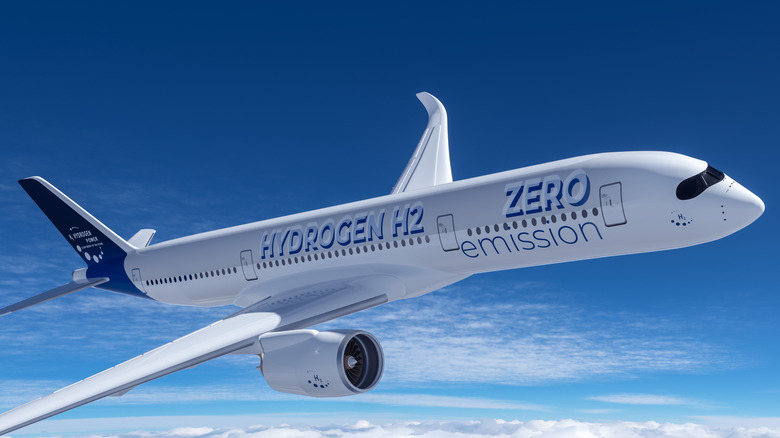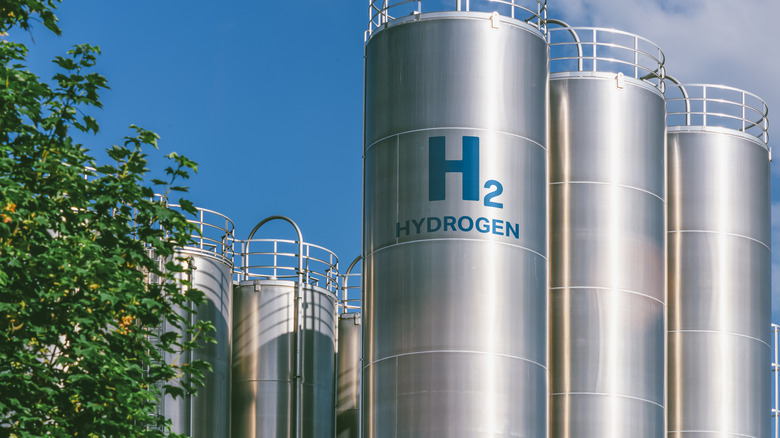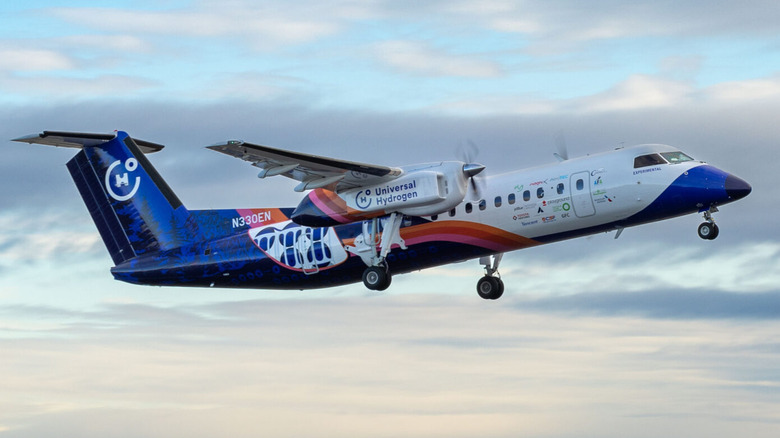Forget Fully-Electric Planes; Hydrogen Tech Is Closer Than You Think
Hydrogen and air travel have had something of an on-again-off-again relationship, but the technology has changed substantially since the days of the Hindenburg disaster and the future is once again looking bright for hydrogen aircraft. New companies like Universal Hydrogen in the U.S. and ZeroAvia in the U.K. have been setting up manufacturing partnerships, attracting investments from key aviation industry players, and — crucially — completing successful test flights of hydrogen-powered airplanes.
The Department of Defense experimented with hydrogen powered planes as far back as the 1950's using a Martin B-57 Canberra, while the Soviet Union converted a Tupolev aircraft (Tu-155) to use hydrogen in the 1980's. But why is this concept making a strong resurgence now?
Hydrogen is the most abundant element, accounting for 9 out of 10 atoms in the entire universe. It's also extremely energy dense and much lighter than jet fuel — lighter than air, in fact — which is what makes it an appealing fuel for rocket launches. But hydrogen has its challenges too. For one, it takes up a lot of volume when it's a gas, which is typically the form it takes on Earth. To change it into a liquid requires lowering its temperate below -423°F and then storing it in insulated tanks, which is both expensive and energy intensive. Additionally, there isn't infrastructure in place to produce, store, and transport hydrogen fuel. But the benefits may be beginning to outweigh the costs.
Change is on the horizon
Who is driving the push for hydrogen aircraft? Airlines are among the biggest proponents. The industry is notoriously competitive, and among their biggest cost is fuel. The price of jet fuel is subject to price swings, which translates into millions of dollars in uncertainty and risk. On top of the cost of fuel, airlines are focused on efficiency. If hydrogen is physically lighter than existing fuel options, it can lead to significant cost savings at large scale.
Also driving the change for airlines is the bad press the industry receives around emissions. Aircraft account for more than 2% of total global CO2 emissions, and those emissions are expected to grow in the coming decades. Hydrogen as an aircraft fuel, on the other hand, can take two forms: hydrogen combustion, and hydrogen fuel cells. The former releases 90% less NOx — a primary particulate air pollution — as compared to burning kerosene, and the only byproduct of the latter is water.
But what about electric airplanes? Isn't there a reason electric automobiles are far outpacing hydrogen cars? Yes, and the answer is infrastructure. Converting over 100,000 U.S. gas stations is a massive challenge, but focusing on only the highest-volume airports can quickly have an outsized impact. Additionally, equipment weight is a much bigger factor for airplanes than cars, and battery technology still isn't ready to take to the skies; but hydrogen is.
How do hydrogen planes work?
Hydrogen fuel cells are getting most (but not all) of the attention in the airline industry. Onboard a plane, these systems combine two things: hydrogen (H2) and oxygen (O2). This reaction produces energy which can then be used to power a motor. The only byproducts are water and heat. Test flights of such systems have been ongoing since March of this year, and so far they appear to be meeting expectations.
A company called Universal Hydrogen, for its part, invented a self-contained storage solution for hydrogen fuel that allows existing planes to be retrofitted for hydrogen fuel. Their modular tanks can be loaded and secured in the cargo area of a passenger aircraft, and then connected to fuel cells. When the plane lands, the tanks can be quickly disconnected and replaced with new ones. Spent tanks return to Universal Hydrogen for refill and reuse.
While this technology is being used on smaller private and regional planes, there is no doubt that large passenger airplanes are the end goal. Airbus is currently working on a hydrogen-powered version of its A380, the largest passenger aircraft in the world. ZeroAvia has plans to offer hydrogen power for 200-passenger planes in under a decade. While when is anyone's guess, for hydrogen planes at least, the future is looking clear.


